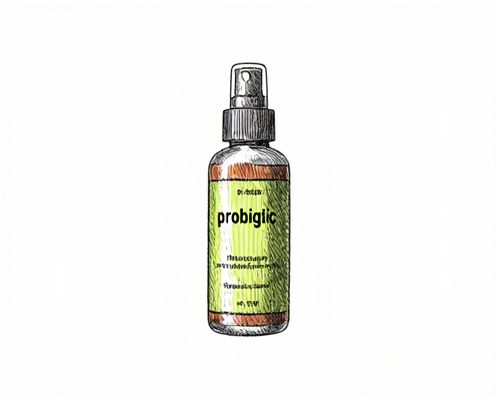
Probiotic skincare Illustration
Probiotic skincare enhances the skin's natural microbiome by introducing beneficial bacteria that balance and protect against harmful pathogens. This approach helps reduce inflammation, improve hydration, and promote a radiant complexion. Incorporating probiotic formulas supports long-term skin health by strengthening the skin's barrier function and soothing sensitive or acne-prone skin.
Introduction to Probiotic Skincare in Modern Beauty
Probiotic skincare harnesses beneficial bacteria to restore and maintain the skin's natural microbiome, promoting a balanced and healthy complexion. Formulations containing Lactobacillus and Bifidobacterium strains have been shown to reduce inflammation, strengthen the skin barrier, and improve hydration levels. Modern beauty embraces these bioactive ingredients to support skin resilience, combat acne, and enhance overall radiance through microbiome-friendly solutions.
Understanding the Skin Microbiome and Its Importance
Probiotic skincare targets the skin microbiome, a complex ecosystem of beneficial bacteria essential for maintaining skin barrier function and immune defense. By promoting a balanced microbiome, probiotic products help reduce inflammation, combat acne, and enhance hydration. Understanding the skin microbiome's role enables the development of formulas that support natural skin health and resilience against environmental stressors.
Key Benefits of Probiotics for Women’s Skin Health
Probiotic skincare harnesses beneficial bacteria to balance the skin's microbiome, enhancing its natural defense against environmental stressors and inflammation. These active cultures promote hydration, reduce redness, and improve skin barrier function, crucial for maintaining youthful, radiant skin. Regular use of probiotic-infused products can result in clearer, more resilient skin, supporting long-term skin health for women.
Types of Probiotics Used in Beauty Products
Lactobacillus and Bifidobacterium are the most commonly used probiotics in beauty products due to their proven benefits in enhancing skin barrier function and reducing inflammation. Saccharomyces, a type of yeast probiotic, is favored for its antioxidant properties and ability to promote skin regeneration. Incorporating these probiotic strains helps balance the skin microbiome, improve hydration, and combat acne and sensitivity in skincare formulations.
How Probiotic Skincare Formulations Work
Probiotic skincare formulations work by introducing beneficial bacteria and bioactive compounds that help balance the skin's microbiome, enhancing its natural defense mechanisms against harmful pathogens and inflammation. These formulations promote a healthy skin barrier, improve hydration, and support the skin's immune response by modulating pH levels and producing antimicrobial peptides. By fostering a balanced microbial environment, probiotic skincare can reduce redness, calm irritation, and improve overall skin texture and resilience.
Top Ingredients in Probiotic Beauty Products
Probiotic skincare products feature top ingredients such as Lactobacillus ferment, Bifida ferment lysate, and Saccharomyces ferment filtrate, which help restore your skin's natural balance and strengthen its protective barrier. These ingredients promote a healthy microbiome by supporting beneficial bacteria, reducing inflammation, and enhancing hydration. Incorporating probiotic beauty items with these key components boosts skin resilience and radiance.
Integrating Probiotic Skincare Into Your Daily Routine
Incorporating probiotic skincare into your daily routine enhances skin's natural microbiome, promoting a balanced and radiant complexion. Apply probiotic-infused cleansers and moisturizers twice daily to strengthen skin's barrier function and reduce inflammation. Consistent use supports long-term skin health by fostering beneficial bacteria and improving hydration levels.
Addressing Common Skin Concerns with Probiotics
Probiotic skincare effectively targets common skin concerns such as acne, inflammation, and dryness by restoring the skin's natural microbiome balance. Strains like Lactobacillus and Bifidobacterium improve barrier function, reduce redness, and enhance hydration levels. Clinical studies demonstrate that consistent use of probiotic-infused products results in clearer, calmer, and more resilient skin.
Probiotic Skincare Trends and Innovations in Beauty
Probiotic skincare is revolutionizing the beauty industry by harnessing beneficial bacteria to restore the skin's natural microbiome, enhance hydration, and reduce inflammation. Innovations include formulations with live cultures and prebiotics that support skin barrier repair and improve sensitivity, making your skincare routine more effective and personalized. Emerging trends emphasize sustainable, clean beauty with probiotic ingredients that promote balanced, radiant skin while minimizing synthetic additives.
Tips for Choosing the Best Probiotic Skincare Products
When selecting probiotic skincare products, prioritize those containing well-researched strains like Lactobacillus and Bifidobacterium for optimal skin benefits. Check for formulations with prebiotics and postbiotics, which support the probiotic activity and enhance skin barrier function. Your choice should also consider products with minimal synthetic additives to maintain the integrity of the live cultures and promote healthier, balanced skin.
 womendy.com
womendy.com